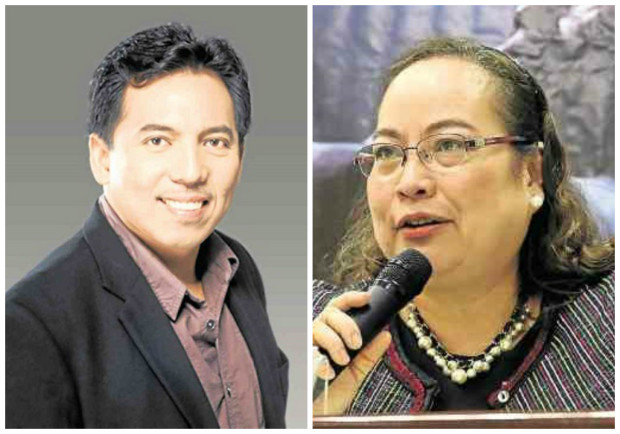So who’s in charge here?
The country’s health insurance system and the well-being of its over 90 million beneficiaries could be the next “collateral victims” in the latest infighting inside yet another government agency.
A power struggle between Health Secretary Paulyn Jean B. Rosell-Ubial and Philippine Health Insurance Corp. (PhilHealth) interim president and CEO Hildegardes C. Dineros could adversely affect the finances of the health insurance system, after it missed the placement deadline for an investment that would have earned up to P200 million in three years, a source said.
According to the source, the memo investing P2.5 billion of PhilHealth funds in Retail Treasury Bond (RTB) was left unsigned because the signatory, acting PhilHealth president and COO Ramon Aristoza, was stripped of his position in early March. The career officer was the first casualty in the Department of Health-PhilHealth power play.
The Ubial-Dineros power struggle follows the sacking this week of Interior Secretary Ismael Sueno because of alleged infighting in the department. Peter Tiu Laviña earlier quit his post at the National Irrigation Authority (NIA), also on corruption allegations and similar infighting in the agency.
Chummy
Article continues after this advertisementUbial and Dineros both claim closeness to personalities with strong ties to President Duterte, sources said.
Article continues after this advertisementUbial is reportedly “chummy” with Davao City Mayor and Duterte daughter Sara Duterte Carpio, while Dineros, a bariatric surgeon, regularly joins medical missions organized by Inquirer columnist Ramon Tulfo, also a close friend of the President and brother of Tourism Secretary Wanda Teo.
Documents furnished the Inquirer showed that Dineros ordered the reassignment of over 40 officers and personnel at PhilHealth, “in pursuit of enhanced and expedient delivery of services …”
But Ubial, in a memo, questioned Dineros’ authority to make appointments, or even reshuffle the staff at PhilHealth.
Quoting several legal rulings, Ubial’s memo said that an OIC has no proper authority “to appoint or fill up vacancies, exercise power to discipline, temporarily or permanently designate, transfer or reassign personnel,” among other powers.
Until President Duterte appoints a permanent president at PhilHealth, Dineros’ authority as interim president “shall be limited to signing documents,” Ubial said.
The squabble started when Ubial, who was bypassed by the Commission on Appointments (CA), recalled the appointment of Aristoza as acting PhilHealth president and COO. Aristoza was due to retire on April 24.
PhilHealth chair
On March 7, 2017, the PhilHealth board elected Dineros interim president and CEO. He was appointed member of the board representing the Informal Sector by President Duterte himself.
Ubial meanwhile sits as chair of PhilHealth, with the secretaries of justice, interior and local government, social welfare and development, finance, labor, as well as the heads of Social Security System, the Government Service Insurance System, the National Anti-Poverty Commission, and the Civil Service Commission. Eight appointive seats are given to sectoral representatives.
On March 9, Ubial issued an advisory changing Dineros’ title from interim president to officer in charge/president and CEO. Ubial maintained that only President Duterte can appoint a permanent president for PhilHealth.
Dineros counter-issued a memo dated March 31, and addressed to all PhilHealth officers and personnel, asking them to address him as “interim president and CEO.”
In a 15-page legal opinion, PhilHealth legal officer Jelbert Galicto said the PhilHealth charter did not mention an interim president at the agency, only a president appointed by Malacañang.
“Not having been replaced by a regular president/CEO appointed by the President, Mr. Aristoza remains the OIC president and CEO,” Galicto said, adding that waiting for Aristoza to retire on April 24 would have spared PhilHealth the “legal nightmare.”
“To further delay the resolution of this controversy is only to dig a deeper and darker pit for all of us,” Galicto, the acting senior vice president for the Legal sector, said.
PhilHealth was established in 1995 to replace the Medicare program created by President Marcos in 1969. It has been modified through several administrations, with the inclusion of the self-employed and the informal sector in 1999, and the overseas workers in 2005.
In 2013, President Aquino approved the Universal Healthcare which included senior citizens and indigents among the beneficiaries of PhilHealth.
